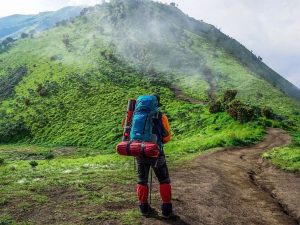Hiking is a great way to stay active and enjoy the outdoors. Whether you’re a senior or not, hiking can be challenging. This article will provide some helpful tips for seniors who want to hike but may be intimidated by difficult terrain or steep inclines. These ten tips should give you the confidence needed to tackle that next hike.

Table of Contents
Plan Ahead
Hiking is a great way to exercise, but it can be very strenuous. Ensure you are prepared for the hike by starting your day with enough sleep and having breakfast beforehand. You should also make sure that you have plenty of water on hand in case you get thirsty along the trail.

Know Your Body’s Limits
Every person has different physical limitations. If you are a senior, it’s important to know your body and what you can physically handle. While some seniors may be able to hike for hours on end at high altitudes without any problems, others might experience shortness of breath or dizziness due to the elevation. Know yourself so that you can avoid injury, particularly if you are older.
Note: If you are under any medications, consult your doctor before heading out on a hike. Many common medications can cause side effects such as dizziness and drowsiness which makes hiking an unsafe activity for someone who has just started taking the medication or is not used to it.

Dress Appropriately
If you’re going on a more challenging hike, it’s important to dress properly. It can be very uncomfortable and even dangerous if your clothes are too restricting or not warm enough for the weather conditions. Be sure that layers of clothing cover all skin so that nothing is exposed as temperatures fluctuate throughout the day.

Start Small & Work Your Way Up
If you are new to hiking or have limited experience, it can be best to start small. Try walking in flat areas for the first few hikes and then slowly work your way up challenging terrain. Remember that everyone has different levels of fitness expertise; this means that what may seem like a difficult hike for one person might not be as strenuous for another. Keep it safe and pace yourself to ensure you can enjoy the hike without getting too tired or worn out.

Take Plenty of Rest Breaks
It is important to take scheduled rest breaks during your hike so you don’t push yourself too hard. If you start feeling fatigued, dizzy, or short of breath, it’s best to stop and sit for a while until the symptoms subside before continuing on with your hike. You should also plan enough time in advance if you know your hike will take longer than usual.

As You Go: Be Aware of Your Surroundings & Condition
Hiking is a good way to get some exercise, but if your surroundings are unsafe then this could be dangerous for seniors as well as other hikers around them. For example, if you are hiking on a trail that is not well marked or does not have any signs to indicate the difficulty of the hike then this may be an indication that it’s too difficult for first-time hikers. Always pay attention to your surroundings and trust your instincts.

Pay Attention & Stay Alert
Hiking can take up all of your mental energy, but it’s important to stay alert while you’re hiking. If anything seems off or doesn’t seem right then take note of this and discuss it with your group when you get back down the mountain/trail.

Share Your Plans
Before you head out on your hike, be sure to let people know about your plans and when they should expect you back. If anything were to happen while hiking (i.e., sprained ankle), it would be important for someone to know where you are in case of an emergency.

If You Get Lost Stay Calm & Find Shelter
It’s important for seniors who like to know what their next steps should be if they get lost. If you find yourself in this situation, stay calm and assess your physical condition before deciding on the best course of action to take. Try to remember what time of day it is so that when you’re ready to start moving again you can do so when there’s more daylight available for hiking out safely. You should also try to find shelter in case the weather takes a turn for the worse.

Use Hiking Poles
Hiking poles are inexpensive tools that can make a big difference when you’re hiking. They help reduce the strain on your lower body by taking some of the pressure off of your knees and other leg muscles.
If you want to know more about how to stay safe during your next hike click here to learn more:

FAQ
Q.Is it safe for seniors to hike?
A. Yes, hiking is a great pastime and can be enjoyed by all ages. The only time you might want to reconsider going on a hike with your senior loved one is if they have been diagnosed with health conditions such as heart disease or diabetes that could cause them problems during strenuous activity. However, if you’re able to keep your senior loved one safe while hiking then this can be a great way for them to stay active and get stronger.
Q. Are there certain measures seniors should take to stay safe while hiking?
A. Yes, it’s important for seniors who like to hike to dress properly and pace themselves so they don’t over-exert their bodies during strenuous activity or get too tired on the trail. You should also pay attention to your surroundings and keep an eye on your surroundings so you can stay alert and protect yourself.
Q. How can seniors prepare before hiking?
A. Before you head out on your hike, be sure to let people know about your plans and when they should expect you back. If anything were to happen while hiking (i.e., sprained ankle), it would be important for someone to know where you are in case of an emergency.
Q. What should seniors do if they get lost?
A. If you find yourself in this situation, stay calm and assess your physical condition before deciding on the best course of action to take. Try to remember what time of day it is so that when you’re ready to start moving again you can do so when there’s more daylight available for hiking out safely. You should also try to find shelter in case the weather takes a turn for the worse.
Q. How can I make sure that my hike is safe?
A. While it’s important to be prepared for your hiking trip, you should also keep in mind what type of difficulty level this entails. If you think your physical condition will not allow you to go on a difficult trail then opt for an easier one as opposed to pushing yourself too hard or trying to tackle a trail that is too challenging. You should also always dress properly and bring plenty of water along with you in case you get thirsty and need something to drink.
Q. What are some signs that I should stop hiking?
A. If you experience any of the following symptoms while on your hike then it’s best to stop and rest until they subside: dizziness, shortness of breath, fatigue or feeling overly tired, headache/migraine pain, nausea/vomiting, muscle cramps/spasms, and disorientation.










